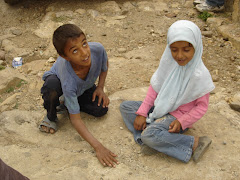Okay - this is a little late, but I'm recovering from jet-lag and trying to get back into academic-semester mode.
On July 21 I posted my views of the current weapons-buying craze among the Gulf countries and how I believe this is linked to US efforts to foment fears about Iranian imperial ambitions in the region. Of course, the majority of these weapons are manufactured by US companies, and thus are a major source of employment and income. The pieces of the puzzle fit so perfectly - the Gulf countries get lots of high tech weaponry that their armed forces don't even know how to operate (but of course for a price we'll send over US experts to train them); the Iranian threat becomes a self-fulfilling prophecy (historically arms races have led to conflict, not prevented it); US weapons manufacturers get loads of money (it's so much sweeter when you can keep the research and development expertise for yourself while pawning the costly product off on some country with more money than they know what to do with). Everyone's happy.
Well, everyone except Israel. Although I'm loathe to agree with the Israeli government I think they have reason to be wary of US arms sales to the Gulf States. Although the US constantly classifies Saudi Arabia as a "moderate Arab ally" (the most egregiously erroneous use of the term 'moderate' I've ever seen) Israel rightly points out that it's only a matter of overthrowing an already illegitimate Saudi royal family, and we have a fully weaponized 'rogue state.' The solution to Israel's opposition to the transaction: more money. So yes, now Israel gets more money (in military and economic aid) from the US, which of course is a major source of contention in the Arab world and a major criticism lodged against Arab governments allied to the US. Noticing the pattern yet? The question is who is getting used here? Unfortunately, such transactions don't make Israel any more secure, don't increase US standing among Arab publics, and don't increase the legitimacy of tenuous Gulf regimes. The only group that benefits from such activities are the major arms producers - so who's running the show here?
Tuesday, August 14, 2007
Subscribe to:
Posts (Atom)
